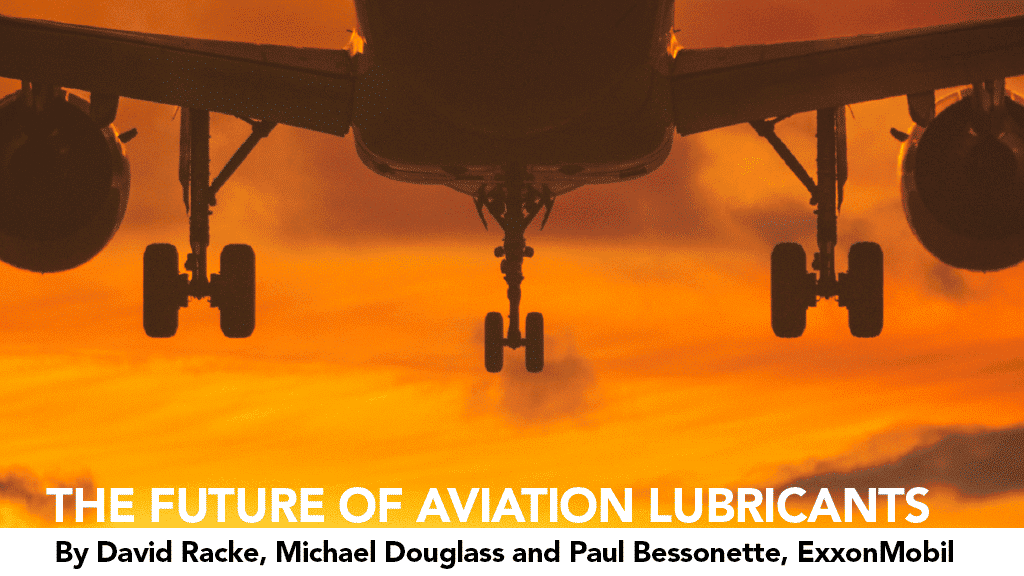Looking ahead to the advances in flight expected over the next few decades, several trends in the aerospace industry will offer unprecedented challenges for lubrication technology. The trend toward more powerful and efficient turbine engines that run hotter will continue in the near term, pointing to a demand for lubricants with increased thermal stability. Other possibilities — including hybrid-electric and even hydrogen-fueled planes — are expected to take the aviation industry into uncharted territory, creating demand for next-generation oils, hydraulic fluids and greases to meet the specific needs of new types of aircraft.
As fleets grow and transform in the coming years, aviation lubricants will need to play an even greater role in removing heat, protecting aircraft components, preventing deposit formation, and reducing friction and wear across a wider range of temperatures. Collaboration between suppliers and OEMs — which play a large role in defining lubrication specifications — will be more important than ever to ensure success.
Today’s lubricants were designed for aircraft whose basic lubrication needs haven’t changed much over the past few decades, and step changes in more advanced, hotter-running engines are relatively easy to anticipate. Looking ahead over the next few years, new geared turbo fans will require load-carrying capabilities that exceed those of today’s highly thermally-stable lubricants. That’s expected to lead to the use of “enhanced ester” oils and other synthetic fluids that can remain thermally stable while meeting tomorrow’s load-carrying demands.
Known Unknowns
Looking further ahead, we start thinking about different low- or zero-emission airplane architectures that rely more on electric motors with very different lubrication needs. We’re already seeing announcements from OEMs developing turbogenerator technology that includes small engines designed for hybrid-electric applications. Such a system would serve as an on-board power source to help extend aircraft range and complement the use of sustainable aviation fuels. If OEMs and their commercial airline customers opt for fleets powered by a combination of electric motors and turbine engines, these hybrid aircraft will have specific performance requirements for their lubricants. Their motors might, for example, require novel greases to reduce noise as well as oils that retain their jet engine lubrication functions while also accommodating electric motor cooling needs.
Even as a handful of airlines order electric planes that could potentially be used for regional flights, fully electric-powered aircraft face several challenges today, none greater than battery size, weight, and efficiency. Jet fuel can hold about 50 times more energy compared to batteries per unit mass, according to Gökçin Çinar, assistant professor of aerospace engineering at the University of Michigan. Çınar’s September 2022 article in The Conversation also points out that one pound of jet fuel would provide the equivalent power of 50 pounds of batteries. As the efficiency gap between jet fuel and electric batteries narrows, maintenance, repair and overhaul (MRO) organizations should be thinking about lubrication strategies that account for a greater number of electric motors. These motors might be used as a power assist during takeoff and climb, replace heavy hydraulic systems, or simply to power aircraft taxiing to the runway.
The lubrication requirements for hydrogen-powered aircraft likewise remain in the realm of speculation, although some OEMs have begun designing prototype systems, ranging from classic turbine engines that burn hydrogen to more speculative fuel-cell-powered aircraft. Assuming the technology continues to develop and gains traction in the industry, these aircraft will still require motors and some sort of propeller or turbine. Although many of the engineering and technical challenges remain to be worked out, lubrication experience tells us hydrogen-powered planes will need advanced lubrication products that pass all the necessary safety regulations and enable new technology options, as well as a lubrication supplier prepared to meet their needs.
Experience Counts
Years of experience developing lubricants for electric cars and trucks are helping us prepare for a time when electric vehicles could be the predominant form of air transportation. We’re also gaining valuable experience developing and testing new formulations in small batches to meet the needs of OEMs developing prototype hybrid aircraft. These type of pilot projects ensure we know what to expect from these vehicles as they eventually move into commercial production and use.
Regardless of how aircraft are powered moving forward, the common factor is they will rely more and more on electricity and other nontraditional energy sources. This gives suppliers an idea of what’s coming and how they can adapt and respond.

